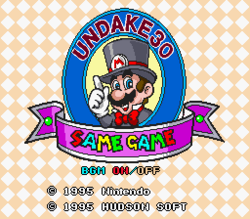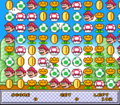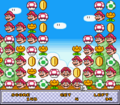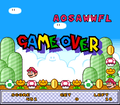UNDAKE30 Same Game: Difference between revisions
No edit summary |
Tags: Mobile edit Advanced mobile edit |
||
| (100 intermediate revisions by 49 users not shown) | |||
| Line 1: | Line 1: | ||
{{ | {{italic title}} | ||
|image = [[ | {{another language}} | ||
|developer = [[Hudson Soft]] | {{game infobox | ||
|publisher = [[Nintendo]] | |image=[[File:Samegame.png|250px]] | ||
| | |developer=[[Hudson Soft]] | ||
|publisher=[[Nintendo]] | |||
|release='''ROM cartridge:'''<br>{{flag list|Japan|Distributed from 1/16/1995 to 2/20/1995}} '''Satellaview download:'''<br>{{flag list|Japan|Premiered April 1995<ref>[http://www004.upp.so-net.ne.jp/tadabomland/softSAMEGAME.htm info on all Japanese versions of "Same Game", in Japanese]</ref>}} | |||
|languages={{languages|en_us=y}} | |||
|genre=Puzzle | |||
|genre = Puzzle | |modes=Single player | ||
|modes = Single player | |ratings= | ||
|ratings = | |platforms=[[Super Nintendo Entertainment System|Super Famicom]] | ||
|platforms = [[ | |format={{format|snes=1|bsx=1}} | ||
| | |input={{input|snes=1|snesmouse=1}} | ||
|serials=SHVC-ANZJ-JPN | |||
| | }} | ||
}} | '''''UNDAKE30 Same Game''''' (also known by its full title '''''UNDAKE30 Same Game Daisakusen Mario Version''''') is a puzzle game developed by [[Hudson Soft]] that was released in 1995 in Japan for the [[Super Nintendo Entertainment System|Super Famicom]]. It is a variant of the tile-matching puzzle game ''{{wp|SameGame}}'' with graphics themed to the [[Super Mario (franchise)|''Super Mario'' franchise]]. | ||
==Gameplay== | |||
The game can be controlled with either a standard joypad or the [[Super Nintendo Entertainment System#Super NES Mouse|Super Famicom Mouse]], and it is similar to the card game {{wp|Monte Carlo (card game)|Monte Carlo}}. The game centers around a large playing field composed of a random arrangement of [[Mario's face|Mario heads]], [[Coin]]s, [[Yoshi's Egg|Yoshi Egg]]s, [[Fire Flower]]s, and [[Super Mushroom]]s. If two or more icons of the same type are connected vertically or horizontally, the player can move the cursor and double-click to make all the connected icons disappear. The icons above then fall down, potentially allowing the player to clear even more icons. There is an undo move that allows the player to take back the last move and move back as far as wanted. Once the entire grid is clear, the game ends. However, if the player ends up in a situation where no two icons of the same type touch each other, a [[Game Over]] occurs as the player is unable to make any more moves. | |||
==Release | ==Release format== | ||
The ROM cartridge is a promotional release. It was given to stores to display and to winners of game tournaments as a prize. <ref>[http://kikaim.s8.xrea.com/game/sfc/samegamem.htm info on "Same Game Mario" in Japanese]</ref> | The ROM cartridge is a promotional release. It was given to stores to display and to winners of game tournaments as a prize.<ref>[http://kikaim.s8.xrea.com/game/sfc/samegamem.htm info on "Same Game Mario" in Japanese]</ref> | ||
A more standard release was in the form of a [[Satellaview]] download, which was broadcasted Mondays at 17:30 (5:30 PM) | A more standard release was in the form of a [[Satellaview]] download, which was broadcasted Mondays at 17:30 (5:30 PM) and was accompanied by an UNDAKE30 Radio show starring Sugiyama Kazuko, the voice of Bomberman. This program aired until 1996. | ||
==Gallery== | ==Gallery== | ||
<gallery> | <gallery> | ||
Samegame2.png|The playing screen | |||
MarioUSG.png|Swapping | |||
Undake30 Same Game Game Over.png|Getting a [[Game Over]] | |||
Samegamecart.jpg|The game cartridge | |||
SameGame-Promo.jpg|Promotional flyer for an event featuring "''UNDAKE30 Same Game''" as a prize. The article has "1996" dates on it, implying that the promotional cartridge was distributed multiple times. | |||
Satellaview-Promo-SameGame.jpg|Promotional flyer for the Satellaview with a picture from "''UNDAKE30 Same Game''" | |||
</gallery> | </gallery> | ||
==Media== | |||
{{media table | |||
|file1=U30SGM Title.oga | |||
|title1=Title | |||
|file2=U30SGM Mario Mix-Up.oga | |||
|title2=In-Game Theme | |||
|file3=U30SGM Game Over.oga | |||
|title3=Game Over | |||
|file4=U30SGM Perfect.oga | |||
|title4=Perfect | |||
|file5=U30SGM Unused Song 1.oga | |||
|title5=Unused Song 1 | |||
|file6=U30SGM Unused Song 2.oga | |||
|title6=Unused Song 2 | |||
|file7=U30SGM Unused Song 3.oga | |||
|title7=Unused Song 3 | |||
|file8=U30SGM Unused Jingle.oga | |||
|title8=Unused Jingle | |||
|file9=U30SGM Unused Sound 1.oga | |||
|title9=Unused Sound 1 | |||
|file10=U30SGM Unused Sound 2.oga | |||
|title10=Unused Sound 2 | |||
|file11=U30SGM Unused Sound 3.oga | |||
|title11=Unused Sound 3 | |||
|file12=U30SGM Unused Sound 4.oga | |||
|title12=Unused Sound 4 | |||
}} | |||
==Names in other languages== | |||
{{foreign names | |||
|Jap=UNDAKE30 鮫亀大作戦 マリオバージョン | |||
|JapR=UNDAKE30 Samegame Daisakūsen Mario Vāshin | |||
|JapM=UNDAKE 30 Shark-Turtle Battle Mario Version; 鮫亀 means "Shark-Turtle" but is likely meant as a pun on the English words "same game", referring to the style of gameplay. | |||
}} | |||
==Trivia== | |||
*This game would serve as the basis for ''SameGame'' for the Super Famicom, which was also developed by Hudson Soft and released the following year. | |||
*''[[Mario Party]]'', another game developed by Hudson Soft, features an [[List of Mario Party pre-release and unused content#Unused data|unused minigame]] based on ''SameGame''. | |||
==References== | ==References== | ||
<references/> | <references/> | ||
{{Super Mario games}} | |||
{{SNES}} | {{SNES}} | ||
[[Category:Games]] | [[Category:Games]] | ||
[[Category:UNDAKE30 Same Game|*]] | |||
[[Category:Japan-only games]] | |||
[[Category:1995 games]] | |||
[[Category:Puzzle games]] | |||
[[it:Undake30 Same Game]] | |||
Latest revision as of 08:33, November 1, 2024
The title of this article is official, but it comes from a non-English source. If an acceptable English source is found, then the article should be moved to its appropriate title.
| UNDAKE30 Same Game | |
|---|---|

| |
| Developer | Hudson Soft |
| Publisher | Nintendo |
| Platform(s) | Super Famicom |
| Release date | ROM cartridge: Satellaview download: |
| Language(s) | English (United States) |
| Genre | Puzzle |
| Mode(s) | Single player |
| Format | Super NES: |
| Input | Super NES:
|
| Serial code(s) | SHVC-ANZJ-JPN |
UNDAKE30 Same Game (also known by its full title UNDAKE30 Same Game Daisakusen Mario Version) is a puzzle game developed by Hudson Soft that was released in 1995 in Japan for the Super Famicom. It is a variant of the tile-matching puzzle game SameGame with graphics themed to the Super Mario franchise.
Gameplay[edit]
The game can be controlled with either a standard joypad or the Super Famicom Mouse, and it is similar to the card game Monte Carlo. The game centers around a large playing field composed of a random arrangement of Mario heads, Coins, Yoshi Eggs, Fire Flowers, and Super Mushrooms. If two or more icons of the same type are connected vertically or horizontally, the player can move the cursor and double-click to make all the connected icons disappear. The icons above then fall down, potentially allowing the player to clear even more icons. There is an undo move that allows the player to take back the last move and move back as far as wanted. Once the entire grid is clear, the game ends. However, if the player ends up in a situation where no two icons of the same type touch each other, a Game Over occurs as the player is unable to make any more moves.
Release format[edit]
The ROM cartridge is a promotional release. It was given to stores to display and to winners of game tournaments as a prize.[2]
A more standard release was in the form of a Satellaview download, which was broadcasted Mondays at 17:30 (5:30 PM) and was accompanied by an UNDAKE30 Radio show starring Sugiyama Kazuko, the voice of Bomberman. This program aired until 1996.
Gallery[edit]
Getting a Game Over
Media[edit]
| File info |
| File info |
| File info |
| File info |
| File info |
| File info |
| File info |
| File info |
| File info |
| File info |
| File info |
| File info |
Names in other languages[edit]
| Language | Name | Meaning | Notes |
|---|---|---|---|
| Japanese | UNDAKE30 鮫亀大作戦 マリオバージョン[?] UNDAKE30 Samegame Daisakūsen Mario Vāshin |
UNDAKE 30 Shark-Turtle Battle Mario Version; 鮫亀 means "Shark-Turtle" but is likely meant as a pun on the English words "same game", referring to the style of gameplay. |
Trivia[edit]
- This game would serve as the basis for SameGame for the Super Famicom, which was also developed by Hudson Soft and released the following year.
- Mario Party, another game developed by Hudson Soft, features an unused minigame based on SameGame.





